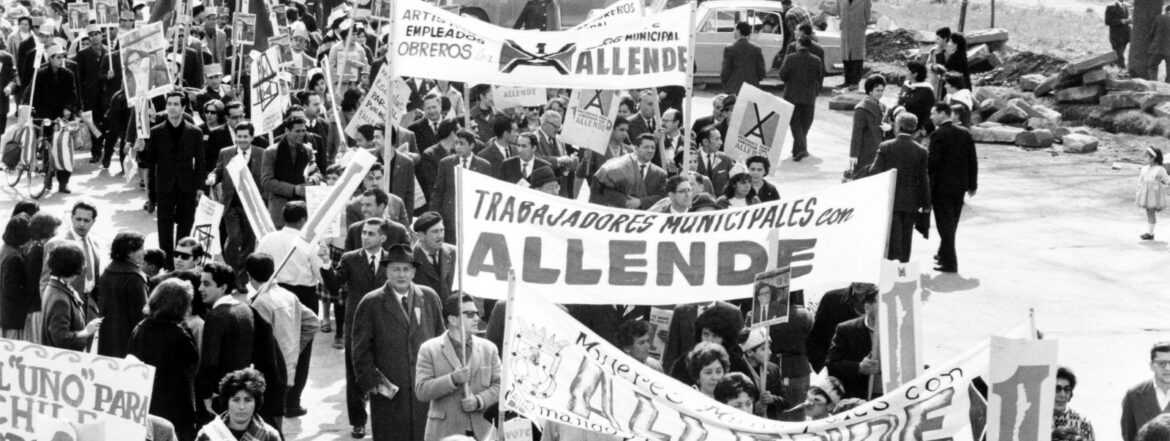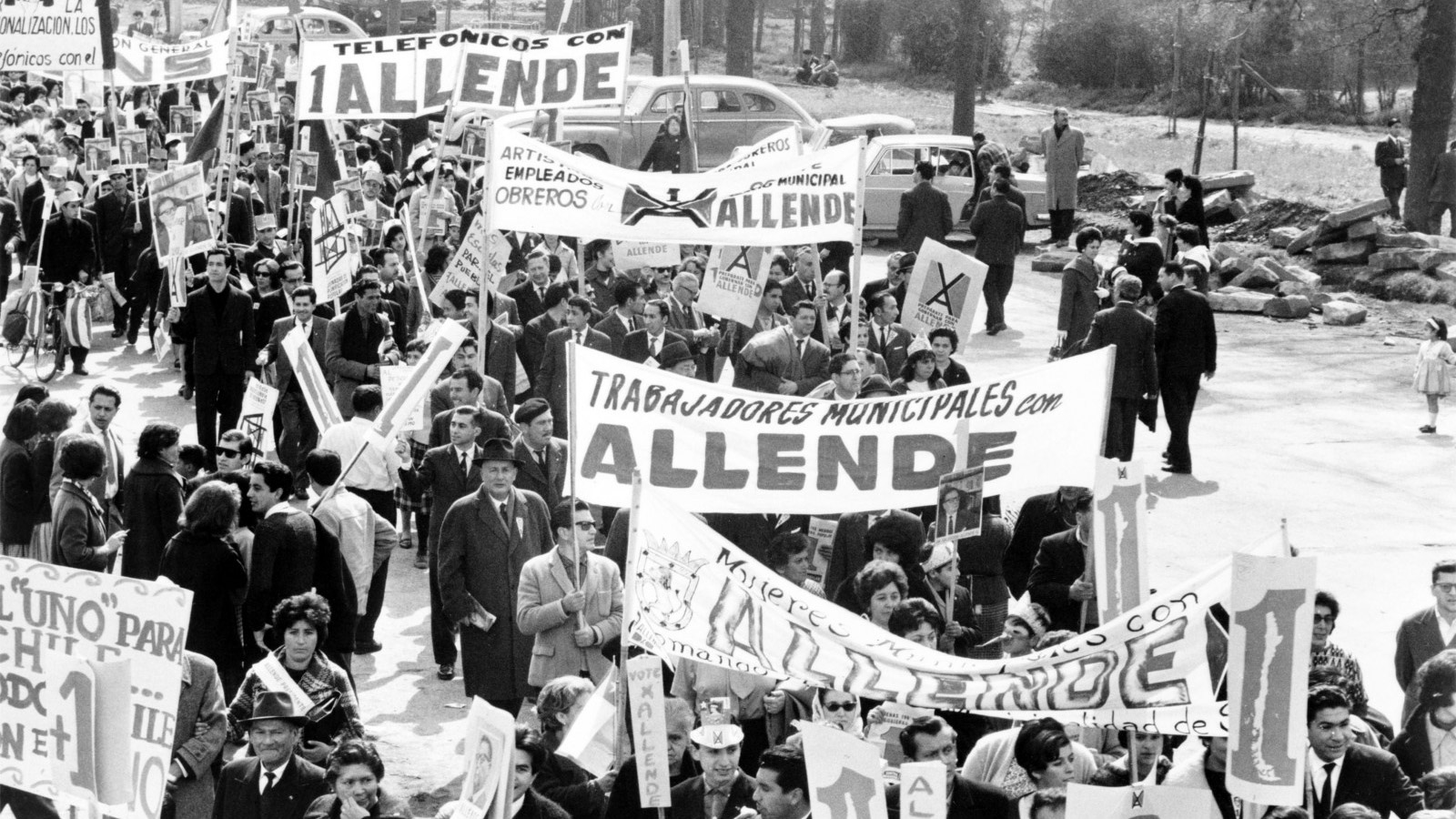The Other September 11th: Chile, 1973
Nov 8–Nov 9, 2013
UC Los Angeles
Royce Hall 314, UCLA | November 8-9, 2013
Heidi Tinsman, History, UC Irvine
Veronica Cortinez, Spanish and Portuguese, UCLA
The violent overthrow of Chilean president Salvador Allende Gossens on September 11, 1973, marked a watershed in global cold war politics. It ended aspirations worldwide for democratically-achieved socialism, initiated seventeen years of military dictatorship, and created the world’s first truly neoliberal nation. Even today, twenty years after Chile’s return to civilian rule, vibrant democracy struggles by students, indigenous peoples, feminists, and environmentalists continue to confront the enduring legacies of cold war authoritarianism.
This two-day conference to be held at UCLA re-centers the history of Latin American cold war violence within contemporary debates about freedom, terrorism, and democracy. It is organized by an extensive collaboration across UC, Cal-State, and USC humanities and social science faculties. It offers panels, films, and musical performance on cultural politics and social movements 1960s-2010s, memory and state violence, resistance and representation, nation and neoliberal subjects, and media and international solidarity.
Program Schedule
Friday, November 8, 2013
314 Royce Hall, UCLA
9:00am-9:15am: Welcoming Remarks
David Schaberg, Dean of Humanities, University of California, Los Angeles
Verónica Cortínez, University of California, Los Angeles
Angela Vergara, California State University, Los Angeles
9:15am-11:00am: Keynote Lecture
Brian Loveman, San Diego State University
“The Political Architecture of Dictatorship: Chilean Democracy 1925-1973”
Respondent: Sebastián Edwards, University of California, Los Angeles
Moderator: Angela Vergara, California State University, Los Angeles
11:00am-11:30am: Coffee Break
11:30am-1:30pm: Unidad Popular: Revolution and Reaction
Chair: Marc Cooper, University of Southern California
Peter Winn, Tufts University
“In the Fist of the Revolution: Industrial Workers in Allende’s Chile”
Thomas Klubock, University of Virginia
“The Agrarian Reform in the Forests: Forestry, Rural Labor, and the State in Chile, 1964-1973”
Heidi Tinsman, University of California, Irvine
“Struggles in the Countryside: Women, Men, and Family Politics, 1964-1990”
1:30pm-2:30pm: Lunch
2:30pm-5:00pm: Working Through the Trauma of the Coup in Literature and Film
Chair: Verónica Cortínez, University of California, Los Angeles
María Luisa Fischer, Hunter College, CUNY
“Zurita: Ways of Exhuming the Day of the Coup”
Roberto Castillo Sandoval, Haverford College
“Strange Co-Pilots: Raúl Zurita and Roberto Bolaño’s Inscriptions of Violence”
Leah Kemp, University of Southern California
“Politics Lost and Regained: Youth in Johnny Cien Pesos and El reemplazante”
Paula Cronovich, Point Loma Nazarene University, San Diego
“No and No: The 1988 Campaign and Pablo Larraín’s Film”
Carla Guelfenbein, Writer and Columnist
“Golpe y exilio: experiencia, memoria y creación”
5:30pm-6:45pm: Dinner
7pm-10pm: Film Screening
Mijita (Chile, 1970, 18 min.) and Prisioneros desaparecidos (Cuba, 1979, 100 min.)
Q&A with director Sergio Castilla
Followed by a Reception
James Bridges Theater, Melnitz Hall, UCLA
Saturday, November 9, 2013
8:30am-10:30am: The Political and Institutional Legacies of the Coup
Chair: Angela Vergara, California State University, Los Angeles
Lois Oppenheim, American Jewish University, Los Angeles
“The Political Significance of the Coup for Chilean Democracy: Hopes, Expectations and Reality”
Lisa Hilbink, University of Minnesota
“¿Una nueva justicia en Chile? Changes and Continuing Challenges Forty Years after the Coup”
Michael Fleet, Marquette University
“The Partido Demócrata Cristiano in Post-Coup Chile”
10:30am-11:00am: Coffee Break
11:00am-1:00pm: Decolonizing the Bío-Bío: Mapuche History and Action
Chair: Suyapa Portillo Villeda, Pitzer College
Luis Cárcamo-Huechante, University of Texas, Austin
“No + palabra wingka: escrituras de agenciamiento mapuche en la ‘transición democrática’ en Chile”
Macarena Gómez-Barris, University of Southern California
“Mapuche Hunger Acts and Cultural Memory”
Florencia Mallon, University of Wisconsin, Madison
“The Archaeology of the National-Security State: Mapuche Visions of the Nation and Chilean Rejections of Federalism, 1850s to the Present”
1:00pm-2:00pm: Lunch
2:00pm-4:00pm: The Memory Question in Chile, 40 Years Later
Chair: Michael Lazzara, University of California, Davis
Steve Stern, University of Wisconsin, Madison
“When ‘Memory’ Mattered: The Curious History of a Cultural Code Word, and Why It Matters”
Elizabeth Lira, Universidad Alberto Hurtado
“Chile: la experiencia de reparación, memoria y justicia en Magallanes 40 años después”
Katherine Hite, Vassar College
“Empathic Unsettlement and the Outsider within Memory Spaces in Chile”
Michael Lazzara, University of California, Davis
“Writing Complicity: The Ideological Adventures of Mariana Callejas”
4:00pm-4:30pm: Coffee Break
4:30pm-6:30pm: Human Rights, Memory and Representation
Chair: Alicia del Campo, California State University, Long Beach
Cath Collins, Universidad Diego Portales
“‘Con todas las de la ley’: Human Rights Defense in and through the Courts in (post) Pinochet Chile”
Peter Kornbluh, National Security Archive
“Secret Documents on Chile: Searching for Justice, Truth and Dignity in the Declassified Records of History”
Alicia del Campo, California State Univesity, Long Beach
“Derechos humanos, memoria y teatralidades refundacionales: la lucha del movimiento estudiantil”
6:30pm-7:00pm: Closing Remarks: Audience
Moderators: Alicia del Campo, California State University, Long Beach, and Macarena Gómez-Barris, University of Southern California
8:00pm Chilean Peña
Social and Public Art Resource Center (SPARC) – 685 Venice Blvd., Venice, CA 90291
Organized by Verónica Cortínez (University of California, Los Angeles), Alicia del Campo (California State University, Long Beach), Macarena Gómez-Barris (University of Southern California), Michael Lazzara (University of California, Davis), Heidi Tinsman (University of California, Irvine), Ericka Verba (California State University, Dominguez Hills), Angela Vergara (California State University, Los Angeles)
Major Sponsors: UCLA Latin American Institute and UC Humanities Research Institute
Co-Sponsored by Pacific Coast Council on Latin American Studies, Radical History Review, College of Natural and Social Sciences (Cal State, LA), College of Liberal Arts and Latin American Studies (Cal State, Long Beach), Department of American Studies and Ethnicity (USC), Department of Spanish and Portuguese (UC, Davis), Departments of History and International Studies (UC, Irvine), Dean of Humanities and Department of Spanish and Portuguese (UCLA)


